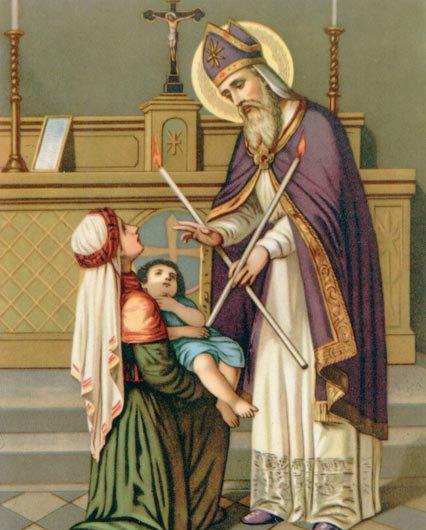
2 minute read
Celebrating The Miracle Of St. Blaise: Feast Day, Feb. 3
This month, we reflect on the life of St. Blaise, bishop and martyr, who is one of the “Fourteen Holy Helpers” — a group of Catholic saints whose intercession is believed to be effective against diseases. Every year on Feb. 3, we celebrate the feast day of St. Blaise, during which parishes around the world bless the throats of the faithful. So, as we continue to navigate the ongoing challenges brought forth by the COVID-19 pandemic, we may look toward St. Blaise’s example and pray for his intercession during these difficult times.
Though we do not know much about the life of St. Blaise, tradition tells us that he was born to wealthy, saintly Catholic parents. Born in Armenia, he devoted his life to medicine and helping the sick. He was a physician, until he was begged by the people to become their bishop. He was appointed by the Church as bishop of the Diocese of Sebaste.
Advertisement
Around the year 313, when the Roman Emperor Licinius was persecuting the Church, Blaise lived as a hermit in the woods among animals that he befriended. One day, a group of hunters found Blaise and seized him. Upon their trip to the governor, they encountered a woman whose pig was being attacked by a wolf. Blaise commanded the wolf to leave the pig alone and, upon his command, the pig was freed unharmed. Blaise was then taken to prison, where he miraculously healed a boy who was choking to death on a fishbone. While Blaise remained in prison, the woman whose pig he had freed brought him two candles to serve as his light so that he could read the Scripture.
It was from the miracle of saving the choking boy that the custom of praying to St. Blaise to cure all ailments of the throat was born. And, so, after still refusing to recant his Christian beliefs, he was suspended from a tree and his flesh was torn with iron combs or rakes.
Blaise was then thrown into a lake to drown. To the surprise of his persecutors, he surfaced and walked upon the water, and he invited his persecutors to join him. They should do this, he said, to show the power of their gods. The pagans took him up on his invitation, and ultimately they were drowned. Blaise was then told by an angel to return to dry land to receive martyrdom. He was beheaded on the shore and immediately went to heaven.
Because of his prison experience and his great reputation as a healer, St. Blaise’s intercession is invoked for the healing of diseases affecting the throat. The candles that the clergy place upon our throats while blessing them symbolize the candles that enlightened St. Blaise’s cell as he studied Sacred Scripture — connecting his spiritual life to the physical healing. Let us remember to invoke the intercession of this great healer upon any ailments that might be affecting us, either physical or spiritual — especially those pertaining to the throat.
The blessing of the throats is done by the priest holding two blessed candles near the throat in the form of a cross. The priest says, “Through the merits and intercession of St. Blaise, bishop and martyr, may God deliver thee from all diseases of the throat, and preserve thee from every other evil. In the name of the Father, and of the Son, and of the Holy Spirit. Amen.”






